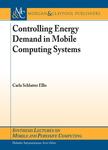版权所有:内蒙古大学图书馆 技术提供:维普资讯• 智图
内蒙古自治区呼和浩特市赛罕区大学西街235号 邮编: 010021

丛 书 名:Synthesis Lectures on Mobile and Pervasive Computing
版本说明:1
I S B N:(纸本) 9781598291285
出 版 社:Morgan & Claypool Publishers
出 版 年:2007年
学科分类:12[管理学] 1201[管理学-管理科学与工程(可授管理学、工学学位)] 08[工学]
摘 要:This lecture provides an introduction to the problem of managing the energy demand of mobile devices. Reducing energy consumption, primarily with the goal of extending the lifetime of battery-powered devices, has emerged as a fundamental challenge in mobile computing and wireless communication. The focus of this lecture is on a systems approach where software techniques exploit state-of-the-art architectural features rather than relying only upon advances in lower-power circuitry or the slow improvements in battery technology to solve the problem. Fortunately, there are many opportunities to innovate on managing energy demand at the higher levels of a mobile system. Increasingly, device components offer low power modes that enable software to directly affect the energy consumption of the system. The challenge is to design resource management policies to effectively use these capabilities. The lecture begins by providing the necessary foundations, including basic energy terminology and widely accepted metrics, system models of how power is consumed by a device, and measurement methods and tools available for experimental evaluation. For components that offer low power modes, management policies are considered that address the questions of when to power down to a lower power state and when to power back up to a higher power state. These policies rely on detecting periods when the device is idle as well as techniques for modifying the access patterns of a workload to increase opportunities for power state transitions. For processors with frequency and voltage scaling capabilities, dynamic scheduling policies are developed that determine points during execution when those settings can be changed without harming quality of service constraints. The interactions and tradeoffs among the power management policies of multiple devices are discussed. We explore how the effective power management on one component of a system may have either a positive or negative impact on over